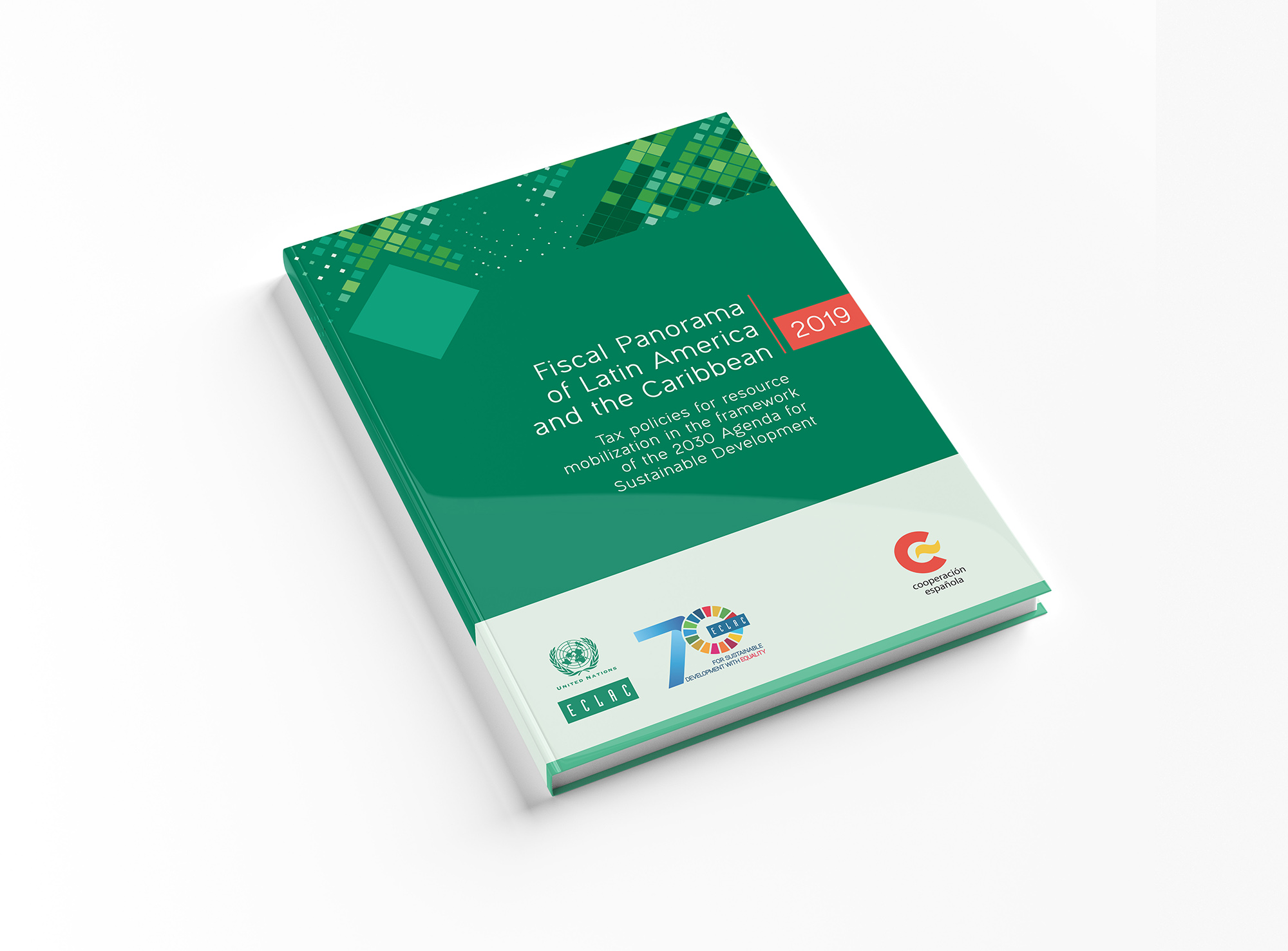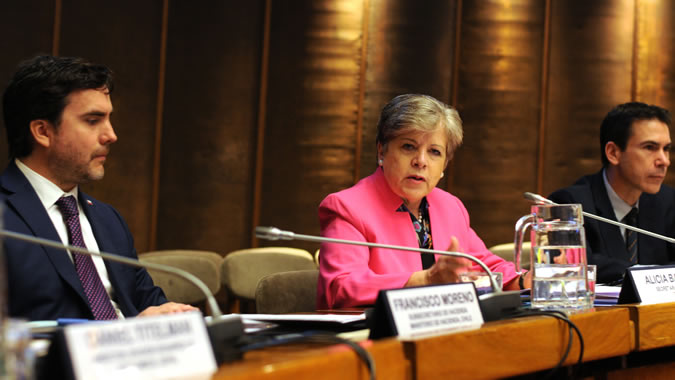ECLAC Reiterates the Importance of Reducing the High Level of Tax Evasion and Illicit Financial Flows to Increase the Region’s Fiscal Space
Work area(s)
In its annual publication “Fiscal Panorama of Latin America and the Caribbean 2019,” the organization highlights the role of tax policy in fulfilling the 2030 Agenda for Sustainable Development.

Increasing public revenue is key to strengthening fiscal policy’s capacity for action and bolstering the mobilization of resources to finance the 2030 Agenda. This according to the Fiscal Panorama of Latin America and the Caribbean 2019, an annual publication by ECLAC released today on the institution’s website.
The report – which analyzes current fiscal trends, the evolution of fiscal policies and their future challenges – adds that tackling the high level of tax incompliance and illicit financial flows in the region is more necessary than ever. According to the latest estimate of the Economic Commission for Latin America and the Caribbean (ECLAC), the regional cost of tax evasion and avoidance amounted to 6.3% of Gross Domestic Product (GDP) in 2017, which is equivalent to $335 billion dollars. Meanwhile, the illicit flows stemming from the manipulation of international trade in goods reached $85 billion dollars in 2016, or 1.5% of regional GDP.
The document will be officially presented on Monday, March 25 by Alicia Bárcena, ECLAC’s Executive Secretary, during the XXXI Regional Seminar on Fiscal Policy, which will take place through Tuesday, March 26 at the United Nations regional organization’s central headquarters in Santiago, Chile and will be attended by ministers and authorities from 10 countries, as well as prominent international experts and representatives of organizations such as the Inter-American Development Bank (IDB), the Organization for Economic Cooperation and Development (OECD) and the World Bank, among others. The event is sponsored by the Spanish Agency for International Development Cooperation (AECID).
According to ECLAC’s Fiscal Panorama 2019, tax policy has gained traction as a tool to boost progress towards the achievement of the Goals of the 2030 Agenda for Sustainable Development. It not only has an impact on the level of available resources, but also on multiple dimensions of the Sustainable Development Goals (SDGs) such as inequality, poverty, and the well-being of women, older persons, youth and other vulnerable populations. In this sense, the challenges that countries face in this area represent significant barriers to achieving sustainable and inclusive economic development.
Along with examining those elements of tax policy that enable progress on the 2030 Agenda and the mobilization of domestic resources, the report analyzes the taxation and oversight of the digital economy in the region in order to demonstrate the weaknesses that favor the erosion of fiscal revenue. In particular, it reviews the unilateral measures that countries in the region have adopted in an effort to close loopholes for tax avoidance and collect tax on digital economy activities.
In addition, the document presents the current state of corrective environmental taxes to address matters of public health in Latin America and the Caribbean, as well as the use of fiscal incentives and preferential tax treatments that limit the mobilization of resources but that, if oriented in an effective way toward investment, could allow for contributing to the targets set forth in the SDGs.
With regard to the current context, the Fiscal Panorama 2019 indicates that the fiscal consolidation process in Latin America and the Caribbean continued during 2018. The primary deficit for Latin American countries as a whole went from 0.8% of GDP in 2017 to 0.5% of GDP in 2018. This adjustment is mainly due to the cuts seen in primary spending – total expenditure before interest payments– which fell from 19.0% of GDP in 2017 to 18.6% of GDP in 2018.
Despite the improved fiscal position registered in Latin America, gross public debt is on the rise and reached 42.3% of GDP in 2018, compared with the 39.4% of GDP recorded in 2017, the document adds. In contrast, in the Caribbean the level of gross public debt has declined, although it remains high, having fallen from 74.3% of GDP in 2017 to 72.4% of GDP in 2018.
Furthermore, and in line with the efforts aimed at fiscal consolidation, the contribution of public spending to growth has contracted. The reduction in capital expenditures in Latin America stands out, dropping from 3.6% of GDP in 2017 to 3.2% of GDP in 2018, its lowest level since 2007. There was also a reduction in primary current expenditures in South America, which could put pressure on social spending, the report indicates.
With regard to public revenue, the report warns that although it remained at the same level as the previous year (18.1% of GDP) in Latin America as a whole, this stability masked divergent performances within the region: such revenue is declining in the group of countries made up of Central America and Mexico, while in South America it is gaining greater dynamism. In the Caribbean, meanwhile, an increase in tax collection and revenue from other sources – including citizenship by investment (CBI) programmes– pushed up total revenues, which reached 27.6% of GDP in 2018 versus the 26.3% recorded in 2017.
Related content

Ministers and Authorities from Latin America and the Caribbean Will Dialogue at ECLAC about Challenges to Public Finances in the Region
The XXXI Regional Seminar on Fiscal Policy will take place at the organization’s headquarters in Santiago, Chile on March 25-26.

XXXI Seminario Regional de Política Fiscal
El XXXI Seminario Regional de Política Fiscal es organizado por la Secretaría Ejecutiva de la Comisión Económica para América Latina y el Caribe (CEPAL), a través de la División de Desarrollo…

Transition toward Sustainable and Inclusive Growth Will Require Changes in Latin America and the Caribbean’s Fiscal Policy
Ministers and authorities from 10 countries in the region are meeting at ECLAC to dialogue about how to expand fiscal space and bolster financing of the 2030 Agenda.

Panorama Fiscal de América Latina y el Caribe 2019: Los desafíos de las políticas públicas en el marco de la Agenda 2030
Presentación de Alicia Bárcena, Secretaria Ejecutiva de la CEPAL, en el XXXI Seminario Regional de Política Fiscal.
Related link(s)
Country(ies)
- Latin America and the Caribbean
Contact
Public Information Unit
- prensa@cepal.org
- (56 2) 2210 2040